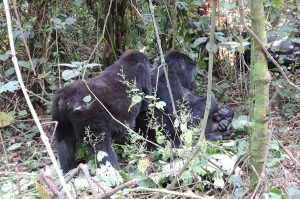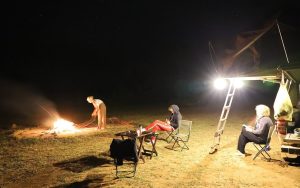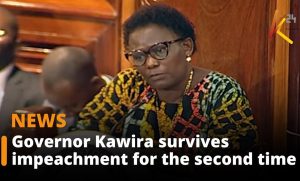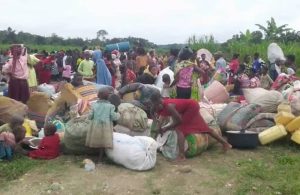When Raymond Rugemalira would head home to East Africa from California to visit relatives in Tanzania and Kenya, his family would ask him many questions about business and agriculture. Although Rugemalira worked in computer science, information communication and technology in California, many of his relatives were small-scale farmers.
“Coming from the diaspora, they’d ask me if I could find them a marketplace, and tell me that the marketplace was not fair,” he told Ugandans Abroad. “I’d also find buyers who would ask me if I could help find a specific type of produce.”
These conversations encouraged the 64-year-old engineer to develop Uza-Mazao, a mobile phone software that he hopes will greatly open up the East African agricultural marketplace, moving it from a black market, where prices are not transparent and frequently manipulated by middlemen, to an open market.
The software is designed to help buyers find the type, quality and quantity of produce they are looking for, at the right price, date and geographical distance. For sellers, it hopes to help them sell their produce at the market rate, at a distance and time that is best for them.
First, the farmer uses a related product called Jua-Bei, which quotes to both buyers and sellers the market rates of different products in different cities and towns regionally. Then, the farmer can use that information to quote the price at which she would like to sell the product through Uza-Mazao.
The software then connects buyers and sellers by finding the best matches in price, geography, buy and sell dates, and quantity. After a transaction takes place between the buyer and seller, both have the opportunity to rate each other from a scale of one to ten.
“The likelihood of cheating or not turning up is less because you have access to a phone number and the relevant information, you can contact each other through a simple text message,” Rugemalira said. Can Uza-Mazao help matooke farmers finallly earn their fair share?
After designing the product for awhile, a friend of the engineer that he knew through church told him about the African Diaspora Marketplace, where African entrepreneurs in the diaspora pitched their business ideas last January to a panel of judges that ranged from Western Union and USAID sector exports to diaspora leaders, individuals from major development organizations, and those working in the private sector.
Ultimately, Rugamelira’s business idea was selected from more than 730 applications, and he became one of the fourteen entrepreneur winners. Rugemalira scored $95,000 to launch his business back home. The Western Union Company and Foundation, as well as USAID, donated the money for the grant. “ADM highlights not only the value of public-private partnership but also the contributions that U.S diaspora communities can make,” said Karen Turner, director of USAID’s Office of Development Partners, during the conference.
<strong>Mango farmers in Kenya</strong>
The software is designed for small-scale farmers in Kenya, Uganda, Tanzania, Burundi and Rwanda. However, Rugemalira hopes to expand it to the tender process for East African governments through legislation. Most East African governments use tenders for institutional buyers like the army, hospitals,
Universities and prisons.
“The system is called the open-tender system, but in reality, if you examine it’s not an open tender,” he said. “It’s two to three brokerage companies. These brokers will give no money to the farmers, and then sell at exorbitant prices to the buyers.”
Rugemalira says that countries like Tanzania have had ‘agriculture-first’ campaigns, which are supposed to support farmers, the backbone of East African economies. “If you are not exposing them to the marketplace, you are preparing them for the slaughter,” he said. You are fattening them up for slaughter by the middlemen.”
Although Uza-Mazao will not eliminate middlemen, a transparent way for farmers to learn prices and find sellers will make the middle-men’s prices much less exorbitant, Rugemalira argues. An experience he had in Kenya reflects the need for using mobile technology to help farmers.
Rugemalira met with a group of mango farmers at a school where 200 pupils had gathered. “I asked the two hundred pupils which of them wanted to be a farmer, and not a single one wanted to,” he said. “I asked the parents about this later, and they said the children are quite bright. They prefer to go to the cities to get employment, rather than remaining in the village and working for nothing. They will not get anything from where they farm.”
However, Rugemalira says, with a good market, unemployed youth in East African urban centers will find a reason to stay in the countryside. “They will start to produce, if farming is actually a viable business,” he said.
The cost of Uza-Mazao is about five times the cost of a normal text message. For example, if someone wanted to sell fifty bushel of matooke at sh5000, they would send out a text to the software that would cost 250 shillings, if a text message is normally fifty shillings. To find out the regional cost of matooke in different cities and towns in Uganda, one would send a text to Jua-Bei at the same cost.
“It is less than the amount of money it would cost to take the bus to the marketplace,” Rugemalira said. Uza-Mazao and Jua-Bei is expected to roll out in Kenya before December 15th, and in January in Uganda. The other three East African countries will soon follow.
If users of the software are consistently rated at 8 or higher, they become eligible for Uza Mazao Ngambo, which allows producers to sell their goods abroad, particularly to the African diaspora.
“We want the African diaspora to buy produce and products from home, so they can help the small-scale farmer,” he said. “We [also] want to encourage fair-trade organizations to use Uza-Mazao to connect directly to the farmer.”
Rugemalira is excited that Western Union and USAID are creating a foundation for the African diaspora to invest in their homelands. The proud grandfather was born in Tanzania, but moved to Russia as a teenager, studying telecommunications engineering in St. Petersburg. He then moved to Finland in 1971, where he achieved a doctorate in the field, and then worked for several companies. Rugemalira also worked as a professor of telecommunications engineering, and started his own product research and development company in Finland.
In 1999, he moved to southern California, and worked for IBM as a senior research and development scientist. He also taught as a computer science professor, and launched his own company, E & M Capital Tek Corporation, which invests in commercial products that support East African development.
The capital from the African Diaspora Marketplace has been a huge help for Rugemalira, who hopes that it might also help him get a loan to expand Uza Mazao further, as well as attract other financing.
The capital helps you become known, and distinguishes your product,” he said. “I am sure once the marketplace is open, we can work at a profit, and with large numbers, the product is very sustainable.” Rugemalaria thinks the African Diaspora Marketplace coincides with greater energy in the diaspora to invest in their homelands, which he feels is both a sense of pride and a chance to get great returns. “In some areas, investment in our countries back home have more revenue than in the money markets in the U.S.,” he said. “It’s not just the diaspora that is discovering this, others are beginning to discover it too.”
He hopes that the diaspora will use this opportunity to bring back new technologies and investments to their countries. African immigrants are forming a critical mass, he says, where they have established their communities and are organizing their energy and resources.





